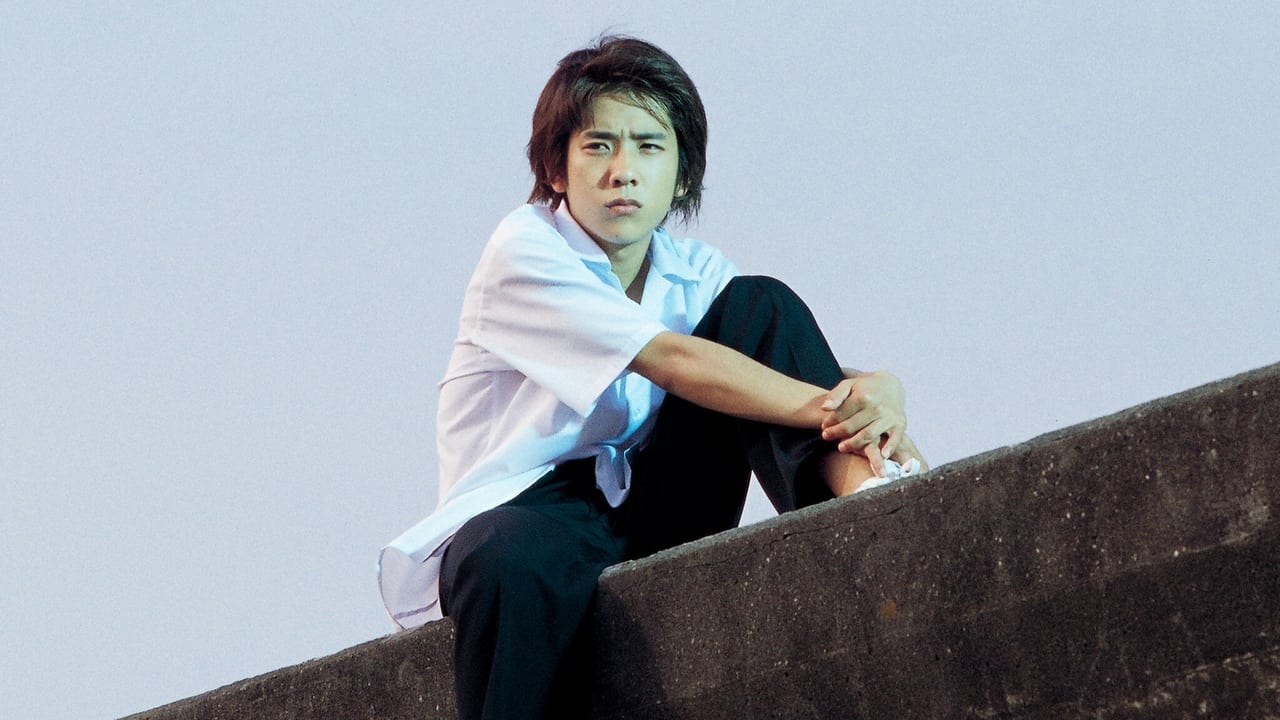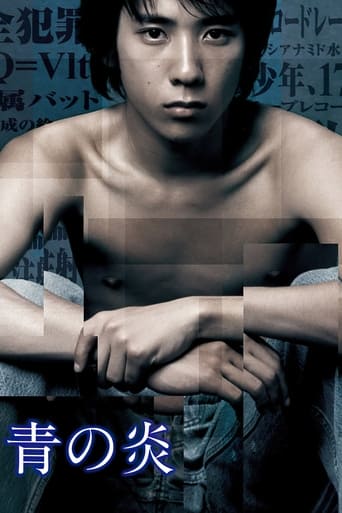RyothChatty
ridiculous rating
MonsterPerfect
Good idea lost in the noise
CrawlerChunky
In truth, there is barely enough story here to make a film.
Cristal
The movie really just wants to entertain people.
Durang0
This movie surprised me completely. It deals with topics that we've seen many times such as child abuse, alcoholism, teenage relationships and juveniles breaking the law. But this is only the surface of the plot and the means of which it contemplates it's main theme. The main theme as I now see it, is the negative side of adulthood hitting a child. This might not sound in anyway peculiar but it's in the delivery that makes it so special.At first I thought the movie's main function was probably to deliver cheap thrills, raise sympathy in the easiest way, speak against domestic violence, tell a moral story or to portray some typical teenage drama. Before the last minutes I still wasn't sure what to make of it, as it seemed to end without any final conclusion. But then when the ending came it blew me away, even if the viewer guessed what was going to happen long before. The point wasn't about what happened, but how it happened and what we got to know about the main character. Who is this guy? Is he a manipulative scoundrel? A hero that saves his little sister? A criminal that learns a crucial lesson? We don't know this for sure before the last scenes.He secretly drinks whiskey, he keeps a bat in his room but doesn't dare to use it, his relationship with Noriko is almost nonsexual. This is (at least how I think it) because sexuality belongs to the adult world that he sees threatening. When he hears the not so dreadful moans of his mother he doesn't know how to react. He is embarrassed for the sake of his sister and mother when he hears his real father Sone masturbating, never mind that his sister later hints that he himself is doing it too. In away, I'd say, that Sone represents Shuuichis darker adult side and it is also that what he fights against. Ironically he uses the same means as Sone, force and hatred to solve the problem. He fights fire with fire. He is trying to protect his childhood but by doing it, ends it himself.One theme of Blue Light is the lack of a father character for a growing boy. He was the only male in the house for 10 years. His teachers seemed to be portrayed either as formally distant or blatantly uninterested in the students. The only one who shows interest in him is the detective, but by then it's too late, as the damage has already been done.For me, Noriko isn't important as a real girl but as an idealization of childhood innocence with her naive answers and the talking dog. At the end of the movie she is crying. Again I take this as a metaphor. Innonce is gone, a broken childhood. While she is holding back tears the main character's list of favorite things is narrated. Here he finally reveals himself. He was not a hero nor a bad guy, just a typical teenager with his little enjoyments in life (with a hint of soon beginning adulthood). After all the schemes Shuuichi pulled and all the lies he told, the knowledge that he was at he same time insecure and vulnerable made me feel an emotive connection that I haven't felt watching movies in a long time.There's also an interesting detail about the use of blue light. Every time Shuuichi is portrayed in blue light, whether it's the night time in his room, the seaside dock or the public aquarium, he is at his most vulnerable and honest state. Other times he always masks himself with lies or dismisses the uncomfortable topics with jokes and daily phrases. Noriko even paints him with blue background, a hint maybe, that she likes him that way.
Elin Johansson
One other user commented on this as being pro-murder under some circumstances. I feel it says the exact opposite, and that's what makes it so good. Our main character is very appealing, we understand his dilemma, and when he chooses to murder, we get to see as the movie goes along, that it was the wrong thing to do.SPOILERS Had he waited, for the first thing, the stepfather would have died of cancer. Secondly, we see he cannot live a normal life after the murder because of psychological effects. And third, he cannot come away with it, he thought he had thought of everything, but there were many mistakes that points to him.NO SPOILERS AGAIN The acting and direction is superb, and the slow pace is both beautiful and effective. I love this movie, it tells a lot about the human being.
Katharine H.
I was really shocked when I saw the film Ao no Honou. Was it because of the plot? No. Because of the subject matter? Not really. The truth was, I was amazed at how well these two pop stars, Nino and Ayaya, could really act. I was expecting, considering the cast consisted of a Hello! Project front girl and a Johnny's Jr. boy, a cute movie about kids in high school. Maybe Kazunari Ninomiya could act a little bit, and maybe Aya Matsuura was thrown in to have a cute face and sing the theme song. Boy was I ever wrong. Ao no Honou dived deep into the psyche of a young man's head, without an obvious voice over theme or very many ways to communicate his thoughts (minus the subtle tape recorder device). It showed what this youth does to protect his family and live his life, but everything he did was natural, from the big, plot-point-esquire actions, to the tiny gestures that Japanese filmmakers are so good at capturing on screen. As the best movies will, Ao no Honou brings you into the movie, and if something shocking, sickening, frightening, depressing, or just tear-worthy happens, you'll feel it. You won't easily forget the face of the talented Ninomiya, either, and don't be surprised if his character's struggles are on your mind for days after watching Ao no Honou.
Flaight
It is a reasonably high tension crime drama of a sort, kind of like Bridget Fonda's 'A Simple Plan' in terms of crime category. That's a rough comparison, but it has a fairly similar concept of crime and irony.The human drama is really what struck me. The story is fairly awkward, awkward enough that you'll pay attention the first time (given that you don't read spoilers – and this is not a spoiler). There is an emotional intimacy without any explicit scenes, which is often seen in Japanese movies. In fact it's so innocent compared to the west, perhaps the emotions it attempts to convey may be lost on the viewer if you don't pay attention. Personally, I enjoyed it because it's a refreshing approach by western standard, where the concept of intimacy is generally based on high energy bed action and explicitness. The director manages to keep it quiet and subtle, often with very few words, yet it's precisely that subtlety that seems to provoke much deeper human emotions of a youth that we might have forgotten in our later years. Intimacy of mind, if you will.The drama is made with strands of various relationship themes, such as good friendship, bad friendship, workplace, parent to son, brother to sister, and the most subtle of all is the love relationship. They are all interwoven to tell the story, but most of these relationships are projected through the 17 year-old high school boy, whose emotional turmoil is the mainframe of the plot. I've been noticing that a lot of Japanese movies often do not define good and evil in a typically Christian-Judean manner, but rather to portray good and evil as 2 sides of the same thing. This director's take on it is also interesting, if you choose to pay attention to that aspect of the movie; everyone seems to have their version of that duality.The scene is beautiful considering it's not a massive movie. Simple, yet effective use of natural resources and camera angles seems to do the job. Interiors are at first uncomfortable, but it grows on you somewhat. Fast action is minimal in the environment, as the main drive is the journey of the mind.The finale is fitting too - not necessarily in terms of what happens, but what is said by the boy; the very last paragraph read out as the movies comes to an end is probably the most significant part of the movie, so you may want to hear it out before you walk off. It seems to finally reveal the essence of the character, his simple boyish desires of life, complicated on the outside by his environment. Just like anyone's life then, with a complex texture of the surface hiding the simplicity of life. They are only simple lines, yet the context is as big as the whole movie. 'Why was the journey so hard then?', I found myself asking as the end credit hit the screen. Perhaps that is an unanswerable question. But what is easy enough to answer when you watch it through is, Why the last paragraph? Perhaps his girlfriend was the true enigma of the story. You will have to decide that yourself.It is strange how life tends to get complicated, even when we are able to appreciate very simple things in life. Why do things get complicated when a simpler life was all you needed? Why does simplicity always get tainted? Only if you could live it again, you would have found the happiness just around the corner – but no, you always have to go the long way to realize how close happiness once was. Or maybe life is only life when there are more questions than answers. Nonetheless you can attempt to answer these questions, if you like.It is not a ground breaking movie by any means, but the philosophy of life as a simple journey is subtly and beautifully projected through a peculiar circumstance, in the context of a maturing 17 year-old. As I found out, there is a slight cultural barrier in the setup and behavior of some characters if you are raised in the west. However, when faced with the philosophical component of it all, perhaps even its story only plays a supporting role. I hope you will feel it with your heart, as much as watch it with your eyes.

